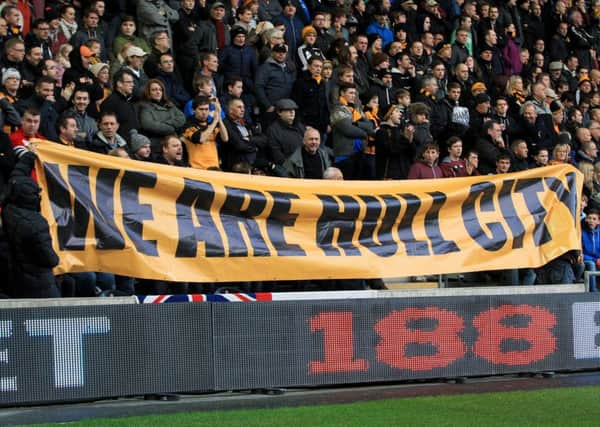A city divided as FA meet to determine future of Tigers


An application by the owners of Hull City to re-brand as ‘Hull Tigers’, first mooted during August 2013, will be voted on for a second time by the Football Association Council.
The decision – which follows the governing body rejecting a previous request in 2014 only for Hull to successfully have that verdict quashed – is likely to shape the club’s future for years to come.
Advertisement
Hide AdAdvertisement
Hide AdIn the ‘yes’ corner are Dr Assem Allam and son Ehab, who after bankrolling Hull’s promotion two years ago to such an extent that the club posted a £25.6m loss that season, see change as the only way to bring a level of sustainability to the KC.
Steve Bruce’s side went down last year but the aim is for an immediate return to the top flight, which the Allams fervently believe will, in conjunction with a re-branding, allow the Tigers to tap into the lucrative commercial markets of the Far East and Asia.
In the ‘no to Hull Tigers’ camp, meanwhile, are supporters determined to retain the club’s identity of well over a century and who have voiced their protest on match day for the past two years.
This group – whose chants of ‘City Till We Die’ were, at times, jeered by other sections of the Tigers support during 2014-15 – are hoping tomorrow will bring a repeat of last year, when 63.5 per cent of the FA Council members, who are drawn from all areas of football, voted to reject the name change.
Advertisement
Hide AdAdvertisement
Hide AdAs has been the case for several months, the club remains tight-lipped on the issue. The Yorkshire Post, however, has this week seen much of the documentation that will form a key part of the Council’s deliberations. Much of it makes for intriguing reading.
Firstly, the Football League seem to have no problem with a possible name change providing it does not infringe certain criteria. One of these is a need for any name to have relevance to the club in question, which is why ‘Tigers’, the club’s nickname of more than a century, is deemed acceptable in a way that ‘Hull Lions’ would not.
The Premier League, meanwhile, made it clear even before Hull’s relegation that the decision over any possible change lies solely with the FA.
What is likely to encourage the Tigers, though, is that a meeting of the Premier League board on May 7 decided that, in matters such as this, “the club is best placed to make the judgment as to the strength of the case after considering all relevant factors”.
Advertisement
Hide AdAdvertisement
Hide AdEqually enlightening are the responses of eight chairmen, five of whom are from the top flight, when asked their views by the membership committee.
On condition of remaining anonymous, six responded that a club should be able to change its name with a quarter even arguing that supporters did not have to be consulted beforehand.
So far, so good for the Allams. Less palatable, however, for the powers-that-be at the KC are likely to be other parts of the final 28-page report that was last month submitted to the Council.
After outlining the club’s case – including Hull’s belief that a re-brand would be initially worth £1m a year in additional revenue and £10m “in year three and four onwards” – the report admits ‘Hull Tigers’ does not breach any of the three restrictions in the FA rulebook.
Advertisement
Hide AdAdvertisement
Hide AdNamely, a new name not be linked to sponsorship, is not “improper” or “offensive” and is “not similar or the same as the playing name of any other club”.
It then, though, goes on to effectively dismiss the club’s season ticket holder ballot in 2014 – which saw 5,874 of the 15,033 eligible supporters respond, with 2,517 voting against the change and 2,565 in favour – for being held in such a manner that the committee was unable to “draw any firm conclusions from it”.
This absence of an independent verifier until after voting is clearly something the membership committee feels undermines the bid, even if the report does add that FA rules on name changes – known as ‘Policy’, whose contents were finalised after Hull’s first application in 2014 – do “not explicitly require a vote of a club’s season ticket holders”.
Hull’s previous offer to pay for the ballot but the FA to be independent verifiers, a request that was turned down, also seems to carry little weight.
Advertisement
Hide AdAdvertisement
Hide AdAlso queried is the club’s claim about the potential income benefits, saying Hull “did not submit any research or a business plan into how it could exploit the playing name of Hull Tigers in its target markets”.
This assertion is likely to anger the club, with insiders recently telling this newspaper that the Allams had been willing to pay £90,000 to leading sports marketing firm, Wasserman, for just such a plan but the FA declined to provide any terms of reference.
That meant the findings could have been rendered useless, so Hull opted not to spend the money.
Tomorrow, the talking stops as the FA Council rules on what is an unprecedented case. A divided city awaits with bated breath.